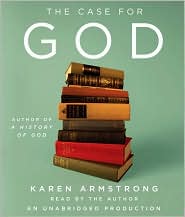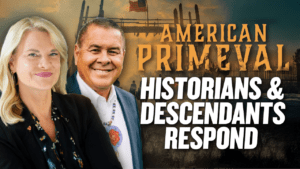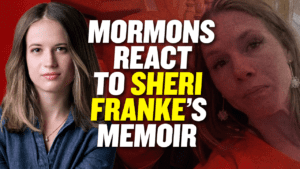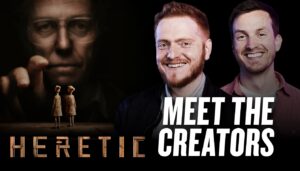
I would like to kick off the inaugural “Mormon Stories Book Club” with our first book: Karen Armstrong’s “The Case for God”.
- In Part 1, I re-publish Terry Gross’ 2009 Fresh Air interview with Karen Armstrong. Please listen to this episode, buy and read the book this week, and next week we will:
- In Part 2, John Hamer, J. Nelson Seawright, Joanna Brooks and I lay out Karen Armstrong’s major premises, and analyze them
- In Part 3, we discuss how Karen Armstrong’s book might or might not apply to Mormonism.
John Dehlin
Part 1
Part 2
Part 3
Mormon Stories Thanks Our Generous Donors!
Our Platforms:
Social Media:
Contact us:
MormonStories@gmail.com
PO Box 171085, Salt Lake City, UT 84117





35 Responses
This sounds great! I actually just finished reading this book yesterday. I’m game!
Whoa! Only 1 week to get it and read it?! Hmmm…that’s a tall order, my friend. Love Karen Armstrong, sometimes I need a little time to process her stuff though.
Great idea… This is one of her books that I haven’t read. A couple of weeks ago I read THE SPIRAL STAIRCASE and loved it. I’ve read her books on Buddha and Mohammed a couple of years ago.
Thanks for all you do John. Your podcast is my favorite. I teach early morning seminary and we listen to “Holy Now” all the time. : )
Hey! If ya’ll can’t get the book in time, no worries at all. This podcast is all you need to be able to discuss next week. In fact, I’ve listened to this episode like 5 times, and I’ve ALREADY READ the book.
Ya’ll are awesome. Can’t wait!!!
BTW, it’s also available on audio……. which is my preferred mode of reading. : ) I just downloaded it from audible.com
I read this book last month, and I really enjoyed it. Although I do have some reservations about Karen’s assertion that mythos used to be completely seperate from logos.
A book club may not be a bad idea, but just do not go Oprah Winfrey on us, John.
I received a gift card to Barnes and Nobel for my Birthday last month. I was thinking about using it to buy this book, but was a bit hesitant. Now you convinced me to check it out!
“We are talking far too much about God these days, and what we say is often facile.” Sounds like a confession there; I think her opening line describes most of what I’ve read/watched of her own work so far. But I’ll give her another chance.
GREAT idea. She smiled when I told her that her book had transformed my faith. Met her at a book signing. Can’t wait to share thoughts with everybody. Thanks John!
What do you call a person who doesn’t believe in a literal and definable god? I think most people would call that person an atheist. I consider Karen Armstrong a de facto atheist. Let’s set aside, for a moment, all the metaphysical double-talk and poetic symbolism. Either a conscious god, with specific attributes, exists or it doesn’t. Either we have, somehow within our physical bodies, spirits “of more refined matter,” that continue to live after our bodies die, or we don’t. Either grandma is up in heaven waiting to welcome us back with open arms when we die, or she isn’t.
This black and white distinction matters in the LDS church because of the culture of literalism and certainty within the church. I think many members are comforted by this certainty. It is nice to sit in testimony meeting and hear how many other people also KNOW that this is the one true church. Karen Armstrong’s approach to religion is almost the complete opposite of the standard Mormon approach.
What a pleasant surprise. I am currently reading this book and am very interested in discussing it. Keep up the good work, John.
I would be very interested in hearing about how the unique aspects of Mormon theology can contribute to the manner of spiritual mode of worship that Armstrong advocates, especially since mainstream LDS worship seems to be placed so squarely within the box of fundamentalism which has absolutely no spiritual appeal to many of us. I thing Sterling McMurrin wrote a book on the transcendent aspects of Mormonism – the title escapes me…
Great choice for the bookclub John. I read this last year while I was recovering from some surgery. I’m looking forward to hearing what you and the panel make of it.
I’ve read several of Armstrong’s books, ‘A Short History of Myth’ is interesting along with ‘A History of God’ and her biography ‘The Spiral Staircase’.
I wonder what she makes of Mormonism as an observer? Would she come on the podcast do you think? It would be great to hear from Jan Shipps too.
What books do you recommend for the future? Something by Joseph Campbell might be stimulating’ The Hero with a Thousand Faces’ or ‘Thou Art That’ perhaps.
Ok thats my ‘two pen’worth’ as we say in Northern England.
I echo some of Steve’s concerns. I just listened to the podcast, and I had a hard time defining how she differs from an atheist. She seemed to tip her hand at the end of the interview when she was asked, “What do you say about all those who have had visions of God?” Her answer was intellectually difficult for me to grasp. Basically, so long as it leads to compassion and love, it doesn’t matter what others’ manifestations are. The end game is compassion for all. Referring to visions, “It doesn’t work for me,” she stated, “but I won’t tell others what they saw.” (I paraphrase.) How can you have it both ways?
In the final analysis, Armstrong appears dogmatic in her compassion. For her, the only purpose of religion is mutual respect and equality. What if a Muslim’s worldview of God is to require women to take a secondary role to men? To a Muslim, this is the will of God. Perhaps this Mulsim had a personal manifestation from Allah so declaring it. But Armstrong’s position is that her mythological God wouldn’t support this. Here, Armstrong would have to tell a Muslim, “Your vision of God is wrong. My worldview of God is more correct than yours.” This is Armstrong’s dogmatism: You must accept equality in the form of the Golden Rule. She has merely traded a Catholic dogmatism for an egalitarian dogmatism. But, at the same time, I don’t blame her in this. It seems that anyone who takes up a narrow truth-claim (e.g. the Mormon version or the Catholic version) necessarily becomes intellectually vulnerable to science and injustice.
An interesting incident to be aware of; a brief article KA wrote:
https://www.guardian.co.uk/world/2003/oct/18/religion.uk
Prompted this response from the Bishop of Durham, re her interpretation of his teachings:
https://www.guardian.co.uk/theguardian/2003/oct/22/guardianletters2
Ok, I read Armstrongs book and found it somewhat unfullfilling. All said and done…I think we could find a better book.
Kirk W,
I am a huge fan of the BioLogos Foundation website where N.T. “Tom” Wright has a few videos and posts there. I read the letter and that sounds like him. He sees both liberal Christian groups and liberal religious scholars entering this stage of “Post Modern” Christianity. What are your own personal views about this?
– Aaron
Hi Aaron,
Not really the right forum for my personal thoughts; you can email me at circvs@hotmail.com if you like for a chat.
Jason, I wouldn’t call her an atheist, nor would she; rather she’s in the tradition of what’s called the “god of the philosophers” in contrast to the “God of the Bible”, which is an ancient antagonism.
Regarding egalitarianism and world religions, something that bothers me is her attempt to link the golden rule to religion, when it only relies on human agreement and has nothing to do with Gods (even if Jesus, Confucius et al. said it, so did the philosophers, outside a religious context; e.g. Epicurus in the 300s BC: “Natural justice is a pledge of reciprocal benefit, to prevent one man from harming or being harmed by another.”).
My final thought is, regarding the mythos/logos split, I understand that Armstrong thinks that it wasn’t until the Enlightenment that religious myths were set against Reason, but look at these:
From Plato’s Phaedrus (360 BC):
“Phaedr. I have never noticed it; but I beseech you to tell me, Socrates, do you believe this tale?
“Soc. The wise are doubtful, and I should not be singular if, like them, I too doubted. I might have a rational explanation…Now I quite acknowledge that these allegories are very nice, but he is not to be envied who has to invent them; much labour and ingenuity will be required of him… And if he is sceptical about them, and would fain reduce them one after another to the rules of probability, this sort of crude philosophy will take up a great deal of time. Now I have no leisure for such enquiries… ”
Or this from Lucretius’s Nature of Things (50 BC):
“When man’s life ay for all to see foully grovelling upon the ground, crushed beneath the weight of Religion which displayed her head in the regions of heaven, threatening mortals from high with horrible aspect… a man of Greece [Epicurus] was the first that dared to uplift mortal eyes against her, the first to make stand against her; for neither fables of the gods could quell him…”.
What a great idea John. I love book clubs. I have read the book and am listening to the podcasts now. I love listening to such interesting conversation. Keep it up!
To me the question of whether Anderson is or isn’t an atheist is secondary to the challenge of modern (or post-modern) life that she has, in my opinion, quite successfully summarized.
Are we required to come down on one side or the other of the dichotomy between science and literal religion? Is that dichotomy even real, or if real, useful?
I can tell you that as a life-long, mission serving, temple-married, plenty of church callings person, I’m hoping against hope that the dichotomy is a false one, and that I am free to accept the historicity of founding stories, creation myths, etc. only to the extent necessary in order to gain the faith required to live according to my covenants and conscience.
On a broader scale, it is clear that much of the philosophical and political fighting that is to some extent driven by the literal religion vs. atheist dichotomy is indeed fruitless or worse.
It may be that having all of the answers — to literally know — is a comfort to some. To others who similarly consider themselves faithful and striving, that certainty (and the efforts to claim exceptional status that often go with it) may be troubling.
So if Anderson’s work spurs a productive dialog within Mormonism that yields creative ways to skirt the (false?) dichotomy, and live with more peace and more unity, I’m all for it.
Of course, by “Anderson” I mean “Armstrong”. The hazards of quickly shooting off a message while at work. :(
John, I LOVED this conversation. I think there is so much more to be said about this gem of a book, but you guys definitely covered some of the most important points. THANK YOU!
Check out Bill Moyer’s interview with Karen Armstrong from March 2009 here: https://www-tc.pbs.org/moyers/rss/media/BMJ-1248.mp3
John, in part 3 you started to take the position that maybe the Church should not try to answer questions. Well, I think that is exactly what the Church has already been doing. And I found myself very uncomfortable with what you were suggesting. I am one of those who found my faith damaged more by the Church’s seeming refusal, or at best inability, to answer my questions than would have been the case if they would have given me a more mature response even if that response had to be in private. I think it would be regressive for the Church to not want to make clearer statements about the very real concerns that are being learned in “Internet Mormonism 101.”
B.H. Roberts asked, “Will not silence…be a confession of defeat?”
I am left with the challenge of figuring out how I can answer my young-adult children’s concerns about gospel issues while getting no help from the Church. Don’t get me wrong, I am trying to uphold the Church in the eyes of my children but the Church seems impotent to help.
I expect that the Church will just wait until there is some kind of doctrinal tipping point where it becomes imperative to act. Then the Church will think of better, more satisfying answers but probably not before.
Great show!
I think Armstrong would agree with Kierkegaard: “Better to truly believe false things than to falsely believe true ones.”
And perhaps even with Robert Ingersoll: “If there be gods we cannot help them, but we can assist our fellow-men. We cannot love the inconceivable, but we can love wife and child and friend.”
So when do we start the next book? I loved the discussion. The podcasts for the first book were excellent. Well done.
Great podcast. You chose an intelligent, articulate panel to discuss the book. Keep it coming!
LOVED this podcast and conversation. Thank you!!!!
Great discussion.
Many of my own feelings were articulated in a way that I could never hope to achieve, and many thoughts were discussed that had not previously occurred to me.
Thanks for the thoughtful discussion.
I see in the discussion an attempt to put new wine in old bottles. There is good evidence that the universe had its beginning approximately 13.7 billion years ago in the big bang. This event could have occurred spontaneously or it could have been consciously caused. If the latter, it would necessarily have been by an immaterial conscious agent, since atomic matter, as we know it, did not come into existence until millions of years after the big bang. This possible creator of the universe is my idea of God. I personally liken this Force to dark energy. I imagine it as influencing the formation of galaxies, stars, habitable planets, and the evolution of intelligent life. Anything else, whether material or immaterial, that identifies itself as God the Creator is in my mind a false god. Over the eternities individual conscious agents could have emerged from Original Consciousness (what we refer to as souls) that are able to inhabit life and experience a material world. Here on planet Earth we have used both mythos and logos in an attempt to explain this process. Mormonism is one such attempt. Perhaps we need new mythos to accommodate current logos.
I really like Armstrong. That being said, I think she is dead wrong when she says that pre-moderns did not read their myths literally. As a long-time student of several pre-modern cultures, I have to say that many of them certainly did.
From my perspective (which I hear somewhat echoed in the panel), many of the things she decries are more a product of the uneducated masses rising up and becoming conscious of their beliefs (and asking themselves: “Why do I believe this?”) than of cultural elites changing their theological tack. Our own story bears this out somewhat: Joseph Smith becomes conscious of his own power to shape his own belief and tries to make sense of his world with the (somewhat unsophisticated) hermeneutic tools available to him. He comes up with some stuff that is modern and progressive, some stuff that is really primitive and backward.
Still, I hear her call for the religious and cultural elite to engage their fellowman more carefully (and I really, really like reading her work, even as I disagree with it).
I’ve often contemplated on ideas very similar to this here’s where I’m at with it. To my understanding of mythology/religion started it started when the caveman found fire – maybe even the burning bush :) Then it evolved to the plant world world, then to animals, and then finally to stars (greek gods, etc..) Joseph Campbell articulates on each these evolutions of Man. And along with each of these dispensations/periods the myths that were told to understand God were comprised out from these viewpoints.
I think one of things that happened in that grove that April morning was to move us into another (possibly final) interpretation of God. We now have gone from the stars to Man himself. I do think there is grave danger in doing so, as articulated so well by Ms. Armstrong, but it has been done and here we are. I’m sure we can use the past to uncover some of the clues, but if we truly are in another mythological dispensation then I think we’ll also have to find ones to gain a better understanding of our relationship to this entity we call God.
The panel discussion was fabulous and it was good to hear that there are Mormons who recognize that their faith is being left out of theological discussions because their faith thinks it already has all the answers. Although it was mentioned that part of the cause was “lay leadership”, I would have like to have heard someone mention more forcefully that not having a single theologian in the Qo70, QoTA, or FP is a fundamental reason why Mormons avoid discussing God in anything but Santa Clause terms. It is likely that as long as MBA’s and attorneys are called into executive leadership in the Church that Mormonism will always be a “Santa Clause” faith and avoid admitting that doubt and incomplete knowledge is an acceptable and necessary part of having a mature faith.
Loved it!